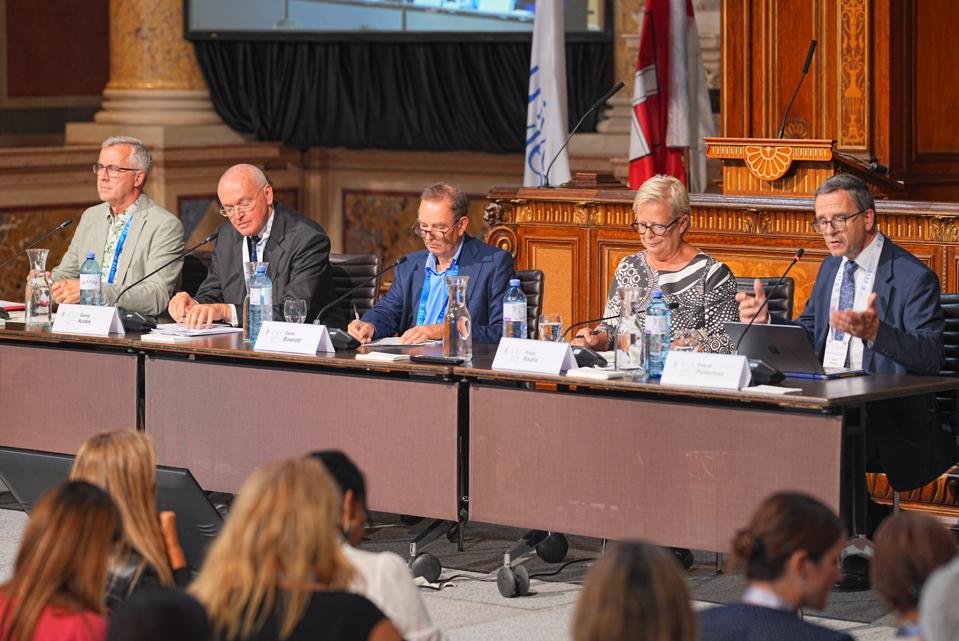In September, the European Law Institute held its annual meeting in Vienna, Austria. The meeting brings together judges, attorneys, professors, and policy experts from throughout Europe to discuss issues facing the European Union. The theme for the 2025 annual meeting focused on sustainability and climate change. A keynote panel addressed the legal links between fundamental human rights and the environment.
Climate change activists have worked to create a link between human rights and climate change. Those claims have drawn validity in a recent series of international court cases that have laid the groundwork for the human right to a healthy environment, including protections from the adverse impacts of climate change. The European Court of Human Rights, ECtHR, issued a ruling in April 2024, Verein KlimaSeniorinnen Schweiz and Others v. Switzerland, that ruled in favor of four senior women who claimed the protection under the European Convention on Human Rights, despite climate change not being mentioned in the treaty.
In May 2024, the International Tribunal for the Law of the Sea issued an advisory opinion that made a similar connection, finding that countries have a obligation to reduce greenhouse gas emissions to protect the marine environment, again, despite climate change not being mentioned in the United Nations Convention on the Law of the Sea. Further establishing an argument that protections from climate change are a fundamental right.
Those two court actions fed into a July advisory opinion by the International Court of Justice, also known as the World Court, that found obligations under customary international law, the Paris Agreement, and human rights treaties. The Court stated, that it “considers that the protection of the environment is a precondition for the enjoyment of human right… that the adverse effects of climate change, including, inter alia, the impact on the health and livelihoods of individuals through events such as sea level rise, drought, desertification and natural disasters, may significantly impair the enjoyment of certain human rights…”
These cases and other developments in this area fed a discussion at the European Law Institute’s annual meeting. ELI is an independent legal think tank funded, in part, by the European Union to draft model rules and provide guidance on emerging topics, focusing on European legal development in a global context. ELI was founded in 2011 and is based at the University of Vienna. ELI Fellows gather in the fall for annual meetings that alternate between Vienna and other host countries in the EU.
The keynote panel, Fundamental Rights and the Environment, was moderated by Owen Bowcott, Former Legal Affairs Correspondent for The Guardian. The panelist were Georg Kodek, President of Austrian Supreme Court; Sirpa Rautio, Director of the EU Agency for Fundamental Rights (FRA); and Andreas Wolter, Chairman of the Climate Alliance, Mayor of the City of Cologne.
Before the panel began, ELI President Pascal Pichonnaz introduced a prerecorded message from Jane Goodall, the famed primatologist who now advocates for environmental issues. Goodall encouraged the legal field to lead in the in the climate change debate.
Wolter began the panel discussion. The Climate Alliance is a network of European cities with 2,000 members. It advocates for climate protection measures that are fair, nature compliant, local, resource conserving, and diverse.
From that perspective, he discussed the role of elected leaders in driving climate change policy. He noted that climate protection is not a mandatory task required of elected officials. It is therefore up to the majority to decide to address the issue, making it more political and difficult.
Rautio spoke directly to a 2025 FRA study, “Towards a fundamental rights-compliant Green Deal”, that advocates for a “human-rights-based approach” to the EU’s environmental policy. The approach builds on the fundamental rights established in the founding treaties for the EU, and other international agreements, to advocate for linking climate change with human rights. Noting that documents do not explicitly address climate change, there is an argument for a “human right to a safe, clean, healthy and sustainable environment.”
Looking at the broader debate and the courts, Kodek spoke to the limited role of the judiciary. He stated that often, elected officials are avoiding the topic of climate change and expecting to leave the decision to the courts. Placing the court in a difficult situation.
Asked about climate change and human rights, he stated there is a movement to establish protections against climate change as a human right. He noted it is not his position to state how far into that process has moved.
Kodek provided insight on the case of Müllner v. Austria, currently before the ECtHR. The case claims that Austria violates the complainants human rights by failing to adequately enact measures to reduce GHG emissions. The case before the ECtHR challenges an opinion of Austrian Supreme Court that dismissed based on lack of standing, a topic covered in another ELI panel. Kodek distinguished between the merits of the case before an international court compared to national courts. That the ECtHR is limited in what cases it can hear, so it will not be the format for all climate cases.
However, he noted the perception by some that the Court has become activists, with elected officials threatening to leave the European Convention on Human Rights. (It should be clear that he was making an observation, not a statement of his opinion.) It is an interesting and unintended consequence of using courts created by treaty to effect change.
Development in linking climate change and human rights will continue to be a pressing topic for the courts and elected officials, especially in the European Union. The opinion by the International Court of Justice will be cited in national courts, to mixed results. Actions by the ECtHR will be the driving force in Europe.

